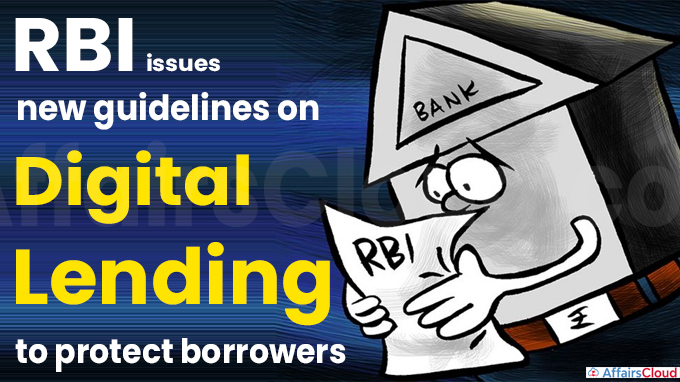
On September 2, 2022, the Reserve Bank of India (RBI) issued official guidelines to all lenders/regulated entities (RE), including banks to protect the data of borrowers using digital lending apps from being misused.
- These directions are issued under sections 21, 35A and 56 of the Banking Regulation (BR) Act, 1949, sections 45JA, 45L and 45M of the RBI Act, 1934, sections 30A and 32 of the National Housing Bank (NHB) Act, 1987, section 6 of the Factoring Regulation Act, 2011 and section 11 of the Credit Information Companies (Regulation) Act, 2005.
- For the adequate implementation of processes to ensure that existing digital loans comply with fresh lending guidelines, RBI has provided a time till November 30, 2022 to REs.
- These new guidelines will be applicable only to existing customers taking fresh loans, and to new customers getting onboarded from September 2, 2022.
RE covered by RBI for these guidelines:
All commercial banks, Urban Co-Operative Banks (UCBs), State Co-Operative Banks, District Central Co-Operative Banks; and Non-Banking Financial Companies (NBFCs), Housing Finance Companies (HFCs).
Key Points:
i.As per the guidelines, REs cannot store borrowers’ data, apart from some basic information.
- A lender can only store information, such as the name, address, contact details of the customers, among others, which are needed to process and disburse the loan, and its repayment.
ii.Digital lending apps cannot store the borrower’s biometric information.
iii.The borrower must be provided with an option to give or deny consent for use of specific data, restrict disclosure to third parties, data retention, revoke consent already granted to collect personal data, and if required, make the app delete/ forget the data.
iv.Consent of the borrower shall be taken before sharing personal information with any third party, except for cases where such sharing is required as per statutory or regulatory requirement.
v.The Key Facts Statement (KFS) apart from other necessary information, contain the details of the annual percentage rate (APR), the recovery mechanism, and the details of the grievance redressal officer designated specifically to deal with digital lending/fintech related matter, as well as the cooling-off/look-up period.
vi.REs cannot levy any fees, charges, etc., which are not mentioned in the KFS to the borrower at any stage during the term of the loan.
vii.The information should be sent to the borrowers on their verified email or through SMS on the successful execution of the loan contract or transaction.
viii.Details of nodal grievance redressal officer must be displayed on the websites of banks, NBFCs, LSPs, DLAs, and also on the KFS.
ix.According to the provisions of the Credit Information Companies’ (CIC) Regulation Act, 2005, issued by RBI from time to time, registered entities shall ensure that any lending done through their DLAs and/or DLAs of LSPs is reported to CICs irrespective of their nature or tenor.
x.A borrower shall be given an explicit option to exit digital loan by paying the principal and the proportionate APR without any penalty during this period.
- The cooling off period is determined by the Board of the RE. The period so determined shall not be less than three days for loans having tenor of seven days or more and one day for loans having tenor of less than seven days.
xi.For borrowers continuing with the loan even after look-up period, pre-payment shall continue to be allowed as per extant RBI guidelines.
Click Here for full Guidelines
Reason behind these guidelines:
The new guidelines on digital lending come after concerns primarily related to unbridled engagement of third parties, mis-selling, breach of data privacy, unfair business conduct, charging of exorbitant interest rates, and unethical recovery practices. RBI has been encouraging innovation in the financial system, and ensuring the protection of depositors’ and customers’ interests.
RBI partially devolves 7-year paper on PDs
RBI partially devolved the seven-year Government Security (GS) on primary dealers (PDs) to maintain the normal 5-6 basis points spread between this paper and the 10-year paper.
This was done during the weekly auction on September 2, 2022.
Key Points:
i.At the auction, 7.10% GS 2029 partially devolved on the underwriters, the remaining three papers (6.69 per cent GS 2024; 7.26 per cent GS 2032; and 6.95 per cent GS 2061) sailed through, with the government raising the overall notified amount of Rs 33,000 crore.
ii.The RBI devolved about 36% of the notified amount of Rs 7,000 crore, the government wanted to raise via the seven-year paper.
Recent Related News:
i.Online payment providers Razorpay, Pine Labs and american payments player Stripe are the 1st players to receive in-principle approval from Reserve Bank of India for payment aggregator (PA) and Gateway licence.
ii.RBI has allowed all eligible current account transactions including trade transactions with Sri Lanka to be/may be settled in any permitted currency outside the Asian Clearing Union (ACU) mechanism with immediate effect.
About Reserve Bank of India (RBI):
Established– 1st April 1935
Headquarters– Mumbai, Maharashtra
Governor– Shaktikanta Das
Deputy Governors– Mahesh Kumar Jain, Michael Debabrata Patra, M. Rajeshwar Rao, T. Rabi Sankar

